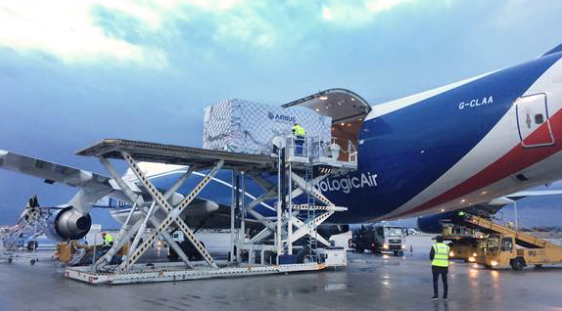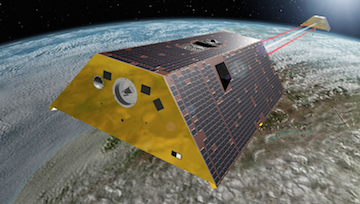
“Adieu GRACE-FO!” German-built gravity research satellites are on the way to the launch site at Vandenberg Air Force Base in California – launch is planned for spring 2018.
Twins are on their way from Germany to California ... two satellites that will orbit with a distance of 220 kilometers between them

The twin GRACE-FO satellites have now set off on their journey to Vandenberg Air Force Base in California. Together with test equipment totalling around 45 tons, the gravity research satellites built and developed by Airbus in Friedrichshafen (Germany) were loaded overnight onto an air freighter at Munich airport and flown to the USA this morning. GRACE-FO is a joint project between NASA’s Jet Propulsion Laboratory (JPL) based in Pasadena, California, and the German Research Centre for Geosciences (GFZ) in Potsdam.
Both GRACE-FO research satellites are scheduled for launch in spring 2018, and will be placed in a polar orbit of around 500 kilometers and with a distance of 220 kilometers between them. The mission is planned to last at least five years.
The satellites will constantly measure the distance between each other to within a few microns using a microwave system built at JPL. At the same time, a sensitive accelerometer, built at Onera in France, will account for non-gravitational effects, such as atmospheric drag and solar radiation. The data will be used to track the movement of liquid water, ice and land masses by creating monthly maps of the changes in Earth’s gravitational field. GRACE-FO continues this essential climate record established by the predecessor GRACE mission, a joint project between the United States and Germany. GRACE ended its science operations in October after more than 15 years of operations.

The GRACE-FO satellites will also feature a new inter-satellite laser ranging instrument, developed in a German/American joint venture, which will be tested for use in future generations of satellites. In addition, each satellite will record up to 200 profiles per day of temperature distribution and water-vapor content in the atmosphere and the ionosphere to aid weather forecasting.
A team of 15 Airbus space engineers and technicians are currently awaiting the arrival of the satellites in California. The plan is to assemble all test systems on site and check the GRACE-FO spacecraft before the Christmas break in readiness for the launch campaign in 2018.

